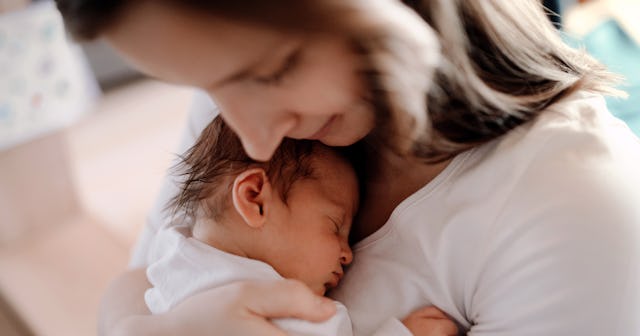Small Study Shows Slight Developmental Delays In Infants Born During Pandemic

Some babies born during stressful times lag behind developmentally — and that’s proving true for the pandemic
A small study of 250 babies born between March and December of 2020 in New York City found a slight developmental lag in social, cognitive, and motor skills, probably due to the COVID-19 pandemic and the stress on mothers and babies during that time.
The study was published in JAMA Pediatrics this week and conducted by researchers at Columbia University. In the study, researchers surveyed the parents of 255 babies born during the early months of the pandemic, asking them about typical 6-month milestones like rolling over, smiling, and babbling. The scores were then compared with those of 62 6-month-old babies born at the same NYC hospitals before the pandemic.
While the researchers were initially interested in discovering if getting coronavirus while pregnant affects infant development, they ended up finding out that just living during the pandemic affected the outcome of babies in general.
The lead study investigator Dr. Dani Dumitriu, an assistant professor of pediatrics and psychiatry at Columbia University and a newborn hospitalist at the Morgan Stanley Children’s Hospital, doesn’t know precisely what caused these delays; she believes it’s probably a combination of factors, all related to the pandemic. The most obvious factor, which has been found in the past, is the stress on pregnant mothers during turbulent times. But other factors are likely at play as well, including the general stress on families during the pandemic, the isolation of lockdown, and family events like job loss or unstable housing.
It’s super important to note a few things about the study before getting too alarmed about the findings.
First of all, the mothers and babies involved in the study lived in New York City during the early days of the pandemic — where it was raging and where lockdown was tight.
“It was in New York City… it was the epicenter of the epicenter, so it was a very stressful environment,” says NBC News Senior medical correspondent John Torres.
Secondly, the study was small and local.
“It’s a very small sample, taken from a very specific health system in New York City, taken during a very limited time period,” says Molly Wood, an assistant professor of epidemiology at the University of North Carolina Gillings School of Global Public Health and the lead author of an editorial published alongside the JAMA Pediatrics study. “Not that we can’t learn from things that way, but it does speak to a very small slice of the pandemic among pregnant people.”
Finally, the study does not consider the long-term effects of these delays — it could be that babies born during this time catch up as they grow up in more “normal” circumstances.
“Six months is a very early developmental time point. It is not a good predictor of long-term outcomes,” Dumitriu said. “It’s a good predictor of what’s happening at the moment. Six-month-old brains are extremely malleable and plastic, so we can already start talking at a public health level about what to do and potentially mitigate any long-term impact.”
Dumitriu suggested that if you have kids born during a stressful part of the pandemic, there is a lot you can do to encourage their development, whether or not they may be delayed due to the pandemic landscape they were born into.
“If your parents are being very interactive with you, if they’re talking to you, playing with you, engaging with you, getting on the floor,” he said, “it’s going to pay dividends.”
It’s also important to understand that it’s well-established that moms who are pregnant during stressful times, like war or upheaval, often do have infants that are behind developmentally — so it makes sense that some of this trauma is translating to kids with developmental lags.
“What we’ve know in the past, especially in wartime environments, is that the stress that the mother endures during pregnancy can affect the baby overall,” Dr. Torres says.
The good thing about the study is that we now know that kids born during the most stressful times of the pandemic may need extra help — and that tracking them and giving them resources is vital to getting them that help.
If you’re pregnant now and feeling stressed, Dr. Torres recommended speaking up and get help to mitigate that stress.
“Stress is very relative, it’s a very personal thing,” he says. “If you need help, seek help when you can.”